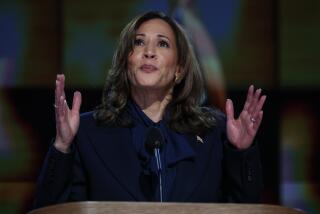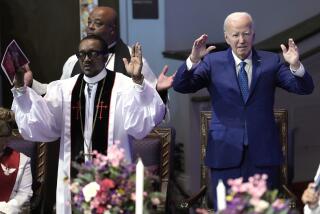Birth control debate riled few beyond parties’ bases
- Share via
The fight over the Obama administration’s rule requiring that all employers provide birth control coverage to their workers, including religiously affiliated hospitals, universities and charities, is the kind of dispute Washington likes best.
Why?
The dispute stirs up ardent partisans on both sides with much less impact on those in the middle, providing an opportunity for groups on both the left and the right to raise money to motivate their supporters without undergoing huge political risk. Two new polls released Tuesday provide evidence for that.
The Pew Research Center looked at who has been following the debate and what they think of it. The key finding: “This issue has attracted much more attention from people at either end of the political spectrum than those in the middle.”
Among those surveyed, only a third reported hearing “a lot” about the issue, with 29% saying they had heard “a little” and 38% saying they had either heard nothing or didn’t know. Among those who identify as tea party Republicans, however, 65% of those surveyed said they had heard a lot about the issue. On the other side of the aisle, liberal Democrats were twice as likely to report having heard a lot about the issue as conservative or moderate Democrats (43% versus 21%).
Predictably, the most partisan Americans not only are paying more attention, they also have the most polarized views on the issue. Among liberal Democrats, for example, 72% say that religious employers should be required to offer contraceptive coverage the same way other employers do, while among Republicans who support the tea party, 82% favor giving religious institutions an exemption from the rule.
In the country as a whole, those opposing views tend to cancel each other out. So among all Americans who reported having heard about the issue, opinion was almost evenly divided, with 44% backing the administration’s position that all employers must provide birth control coverage and 48% favoring an exemption for employers affiliated with a religious institution. Those who identify themselves as independents were less likely to report having heard about the controversy. And among those independents who had heard about, opinion was almost evenly divided, with 48% backing the rule and 46% favoring an exemption for religious employers.
Although the Catholic bishops have been the strongest opponents of the Obama administration’s rule, Catholics were only somewhat more likely to favor an exemption than the public at large, 55% to 39%. The biggest opposition came from white, evangelical Protestants, who are a key Republican constituency. They favored an exemption by 68% to 22%.
Women aged 18-49 -- the group most likely to actually use birth control -- opposed an exemption by 53% to 40%. That group is of keen political interest to the Obama campaign. Overall, men tended to oppose the coverage requirement, while women favored it.
The survey of 1,501 adults was conducted from Wednesday to Sunday. President Obama moved to shift the rule slightly Friday, winning the support of some key Catholic leaders, although not the bishops. That shift had little impact on public opinion, the survey indicated.
Meantime, Gallup looked at whether Catholics’ views of Obama had changed over the last couple of weeks. They haven’t -- at least not in a statistically significant way. Four weeks ago, an average of 45% of Catholics said they approved of the job Obama has been doing. This week, 46% did. In the intervening two weeks, the approval number had ticked up as high as 49%, but all those changes are within the poll’s margin of error of plus or minus 4 percentage points for the Catholic sample.
Over time, it’s possible the issue could begin to weigh more heavily on how Catholics view Obama, but so far, the impact has been minimal.
More to Read
Get the L.A. Times Politics newsletter
Deeply reported insights into legislation, politics and policy from Sacramento, Washington and beyond. In your inbox twice per week.
You may occasionally receive promotional content from the Los Angeles Times.











